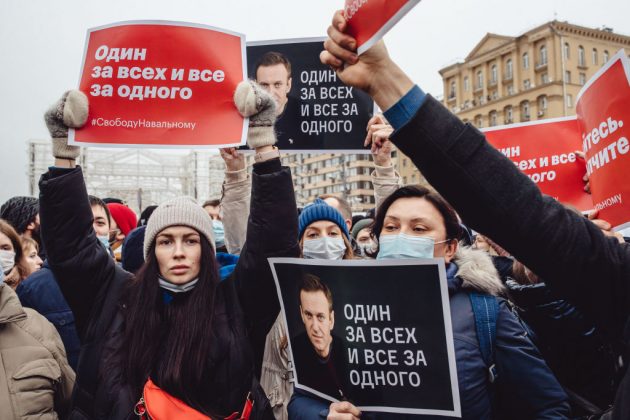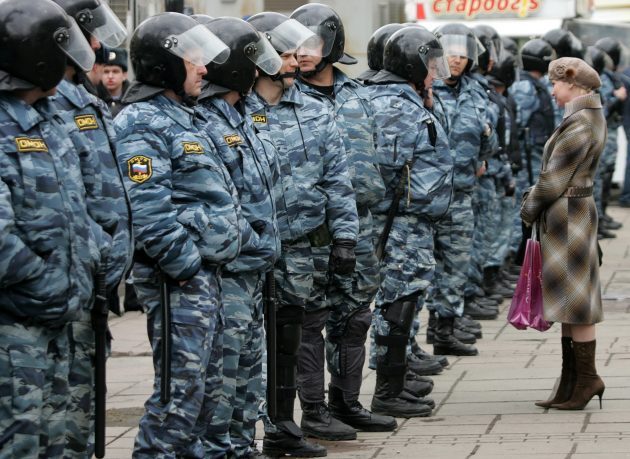Bill Browder: Navalny has sparked something – the West shouldn’t stand by

Once the largest foreign investor in Russia through his Hermitage Fund, Bill Browder is now a global campaigner focussing the world’s attention on Vladimir Putin.
His efforts have seen so-called ‘Magnitsky Acts’ placed on the statute book across the world, named after Browder’s former lawyer – who, most agree, was murdered in Russian custody as he attempted to expose a huge tax fraud against the Russian people.
Bill lives in London, and spoke to City A.M about his career, the protests in Russia against the arrest of Alexei Navalny, and what the West should do to stand up to Vladimir Putin
One would imagine Bill Browder has plenty of reasons not to want to go back to Russia.
Deported in the mid-2000s, he then saw his lawyer tortured and murdered in a Russian jail. Vladimir Putin’s administration has, since then, pursued every angle to denigrate him – from hatching a criminal case for murder to unsubstanitated allegations of tax fraud. He remains, if not Putin Enemy Number One, then certainly in the top few.
You’d forgive him for never wanting to walk through Red Square again. Not so.
“I really feel deprived that I’ve been cut off from a country” he loves, he tells me. “I would like to be able to go there and not fear death or arrest.”
That may remain a distant hope. Vladimir Putin is – despite everything – still very much installed at the top of the Russian state, showing very little sign of wanting to retire to the grandiose Black Sea resort now known as “Putin’s Palace” which has become a touchstone of anti-Putin sentiment.
But Browder is hopeful that things may change – with the current protests against the imprisonment of Alexei Nalanvy, he believes, signalling something significant.
“Look at Belarus,” he says. “They’ve tolerated dictatorship (under Alexsandr Lukashanko) up until half a year ago, when he stacked the election dramatically in his favour when he really would have lost, and all sorts of apolitical people stood up and said truly, enough is enough.
“They came out onto the streets and have been protesting ever since, in a way that has really challenged his legitimacy and probably will end his Presidency.
“Putin feels profoundly scared of the same thing happening in Russia.”
Read more: Alexei Navalny: Police arrest 1,500 amid protests over jailing of Putin critic
Navalny lights the spark – but will it catch?
In recent weeks, democratically-minded Russians have done much the same – protesting from Vladivostok to St. Petersburg, via Yakutsk, a small city in the far east which saw demonstrators come out despite temperatures as low as -51.
The trigger has been the arrest of Alexei Navalny, Russia’s most popular anti-Putin figure and the figurehead around which much anti-Putin sentiment revolves.
He was the subject of an assassination attempt in August last year – a poisoning that saw him become violently ill on a domestic flight. The footage went round the world, and Russia. He eventually recovered in a Berlin hospital, but rather than going quietly into the night, he went back home. He was arrested as he stepped off the plane.
Putin denies he was anything to do with the poisoning, just as he claimed not to know about the “little green men” fighting in Crimea or about the murder of Sergei Skripal in Salisbury.
He “completely misjudged” Navalny, says Browder. Navalny’s return and arrest has given the base, he reckons, for a popular uprising. And whilst the protests are small compared to Russia’s extraordinary size and population, seasoned watchers think there is something at play.
But if Navalny’s arrest provides the spark, the economy – or lack thereof – may provide the kindling.
“It’s been a sclerotic economy for a long time. There’s been no opportunity for small and medium-sized businesses to thrive. It’s a totally corrupt country.
“When people are hungry, they get angry. And in Russia people are hungry and they’re angry,” he says.
But will it last? Browder reckons there are three factors at play.
One, whether Putin’s crackdown on domestic protests work. “Does aggressive repression, that’s going on with Russia as we speak, cause people to go back into their kitchens to grumble, or go out on the streets?”
Two, what Navalny does next.
And third, what Western governments do.

The West Wakes Up
Browder reckons Navalny, as a cause celebre, may force the hands of Western governments to act more decisively. Certainly, it has already been brought up in Parliaments across the world. The Foreign Office, about whom more later, is closely monitoring the situation.
“He’s become such a symbolic figure of defiance against dictatorship. The fact that they tried to kill him, and he still stood up, and then they threaten to arrest him and he still stood up.
“That can’t help but move anybody who watches this in the West and particularly politicians and government officials and so I would expect there would be serious Western sanctions against individuals in the Putin regime.”
Since the death of his friend and lawyer Sergei Magnitsky, Browder has been on a crusade to secure sanctions against people involved both in his case and across Putin’s wider circle. He had some work to do – in 2012, US Presidential candidate was laughed at for suggesting Russia was America and the West’s biggest strategic threat. Most now agree that the Russian bear competes with the Chinese dragon for the top spot.
But years later, the US passed the so-called Magnitsky Act – allowing Congress to revoke the rights and freeze the assets of those considered to be financially important to human rights abuses. The UK eventually got there, too, but slowly.
Browder tells City A.M. that David Cameron has apologised to him for the delay.
“The Cameron Government had blocked me at every stage as I was campaigning for the Magnitsky Act here in the UK,” he says, long after the US had placed their own version on the statute book.
Cameron read Browder’s book, Red Notice, after he’d left office.
“Through a mutual friend, he asked me to lunch. And we went, and literally the moment we sat down he said I want to apologise to you. He said after reading your book I understand I was wrong, that we should have done the Magnitsky Act.”
Cameron later pushed his successor Theresa May to move ahead. Legislation was finally passed in 2018.
“He was blocked by the Foreign Office. He was being pushed by the civil servants in the Foreign Office who were whispering to him that it was a bad idea that you shouldn’t do it,” he said.
The person who most helped him with the Magnitsky Act in the UK, says Browder, was Dominic Raab – now Foreign Secretary.
“When these people whisper to him that things shouldn’t be done, he ignored their whispers because he understands exactly what’s going on, so I would say that we’re probably in better shape than we’ve ever been in here in the UK as far as implementing the… Act,” he reckons.
“I could easily imagine that the UK will… take a very robust stand towards Putin in the Navalny case. I don’t think the UK is going to act alone – it will act in concert with other countries, as the UK should.”
Read more: EU Parliament calls for halt to Nord Stream 2 construction after Navalny arrest

A splintered alliance
Browder is clearer that the West needs to stand together in facing down Vladimir Putin. With Biden in the White House, that seems more likely than it was under his predecessor.
But there is an obstacle, says Browder. The European Union.
“It’s a real big problem.”
He notes the uneven impact Russophiles like Hungary’s Viktor Orban have on European foreign policy.
A version of the Magnitsky Act is on the books across Europe now, but he remains doubtful of its impact.
“Getting any punchy sanctions lists out of the EU are going to be equally hard to do.
“And so I have very strong doubts about whether the EU will be a player in these conversations.”
It is a similar refrain to that struck by advocates for stronger sanctions against China as more and more evidence of their actions in Xinjiang Province and against democratic activists in Hong Kong. The EU’s reliance on Russian energy – particularly Germany – only increases the incentive to soft-peddle foreign policy.
“But if the US does it with the UK, that does have a very significant impact on the billionaire cronies around Putin,” he says. The UK has an outsized role, in fact.
“They’re all here in London and keeping their money here, so we have a disproportionate voice in all these conversations, because if we freeze their assets we’ve taken away one of their most coveted privileges coming here, having their kids go to school here,” he reckons.
So does Navalny. Last week he called for a number of British-resident Russians to have their assets frozen – including the owners of football clubs Chelsea and Arsenal.
Next on the agenda
Browder still undertakes small investments, with his own money. It’s a family trust, as he describes it. But his efforts are focussed on encouraging more ‘Magnitsky Acts’ to appear on statute books across the world, and on their implementation.
“My next job is to get those countries that do have the Magnitsky Act to implement it robustly, not just in the case of Russia, but in the case of China. The Magnitsky Act applies globally to bad guys.”
And goodness knows, there are plenty of bad guys.